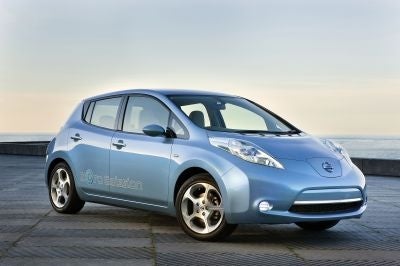Your support helps us to tell the story
From reproductive rights to climate change to Big Tech, The Independent is on the ground when the story is developing. Whether it's investigating the financials of Elon Musk's pro-Trump PAC or producing our latest documentary, 'The A Word', which shines a light on the American women fighting for reproductive rights, we know how important it is to parse out the facts from the messaging.
At such a critical moment in US history, we need reporters on the ground. Your donation allows us to keep sending journalists to speak to both sides of the story.
The Independent is trusted by Americans across the entire political spectrum. And unlike many other quality news outlets, we choose not to lock Americans out of our reporting and analysis with paywalls. We believe quality journalism should be available to everyone, paid for by those who can afford it.
Your support makes all the difference.To fill the void of sound created by near-silent electric vehicles (EVs), Nissan has unveiled the artificial noise its new LEAF EV is going to make when it goes on sale later this year.
The noises have been added as safety devices to protect pedestrians and other road users who are used to being able to hear vehicles as they approach, and are particularly critical for visually-impaired people who rely on the sound of car engines.
Nissan says that its Approaching Vehicle Sound for Pedestrians (VSP) has been developed after four years of research with leading universities and the Detroit Institute of Ophthalmology.
The VSP system is activated for both low speed forward driving and reversing, with the former producing a sound akin to a jet engine and the latter an electronic beep similar to those found on larger vehicles.
The forward sound system ceases operation when Nissan LEAF accelerates to 30km/h (the point at which Nissan says tire noise alone is sufficient to make the car audible) and engages again as Nissan LEAF slows to under 25km/h.
Drivers can also disable the system, something that has brought criticism from the US National Federation of the Blind, which said that it “in effect allows drivers to deactivate this important safety feature and thereby endanger pedestrians, especially those who are blind.”
Nissan says that the disabling feature is temporary and the sound will automatically be re-engaged when the car is restarted.
The LEAF will go on sale in Japan, the United States, Portugal and the Netherlands starting in December, making it one of the first to market - ahead of the competing Mitsubishi iMiEV.
Hear the sound online: http://www.facebook.com/video/video.php?v=10100225651968509

Join our commenting forum
Join thought-provoking conversations, follow other Independent readers and see their replies
Comments